必修3 Unit 2 Healthy eating复习课件(共56张PPT)
文档属性
| 名称 | 必修3 Unit 2 Healthy eating复习课件(共56张PPT) |
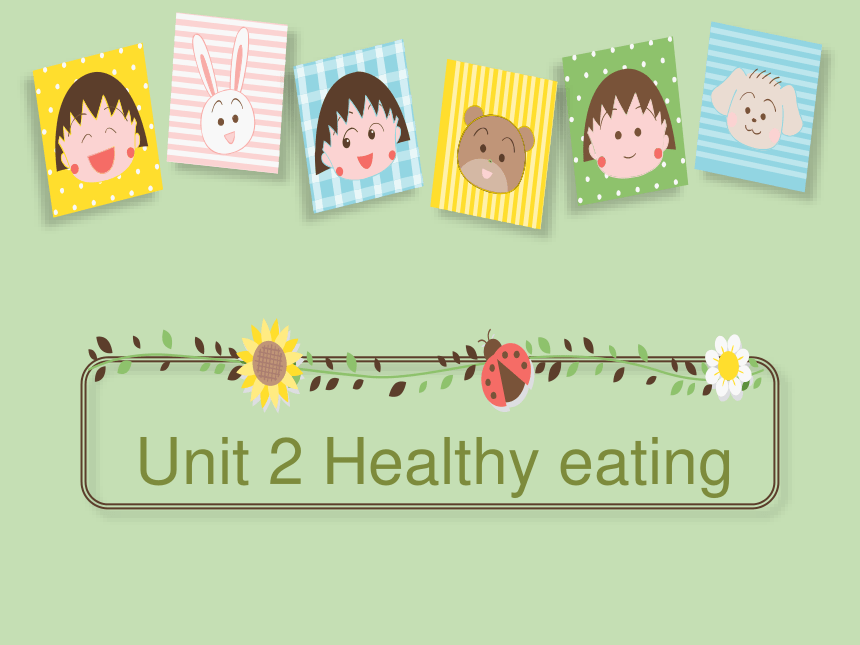
|
|
| 格式 | zip | ||
| 文件大小 | 1016.2KB | ||
| 资源类型 | 教案 | ||
| 版本资源 | 人教版(新课程标准) | ||
| 科目 | 英语 | ||
| 更新时间 | 2020-03-25 16:29:23 | ||
图片预览

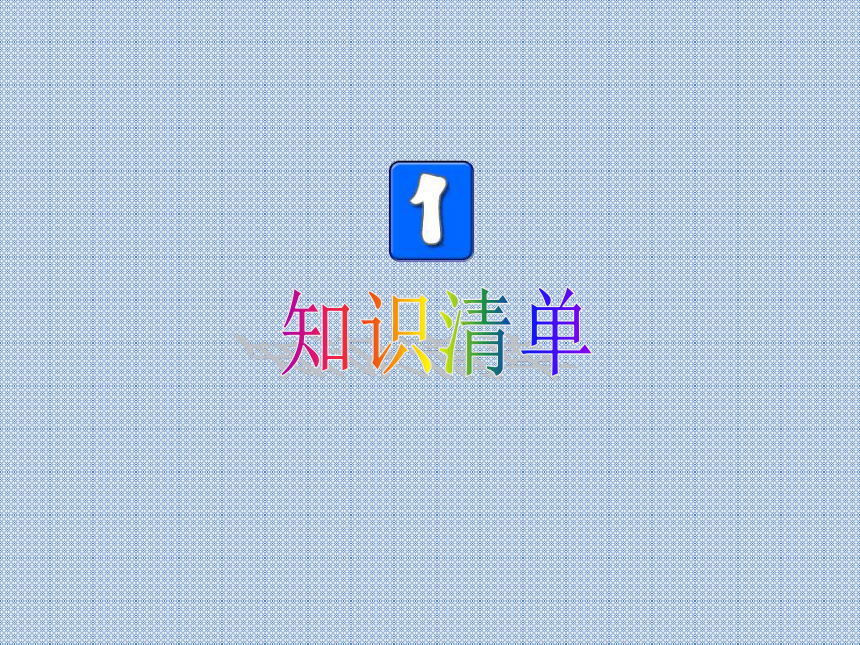
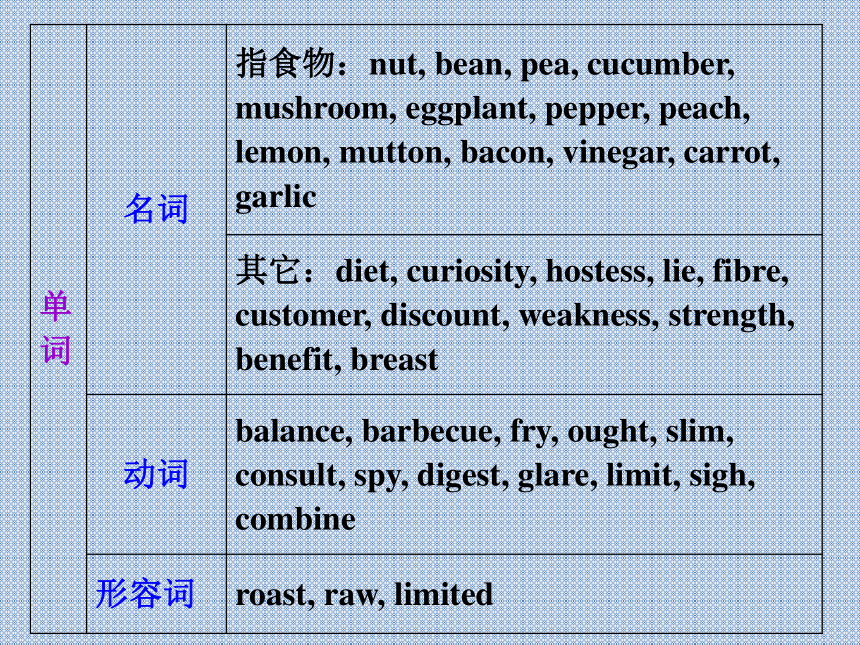
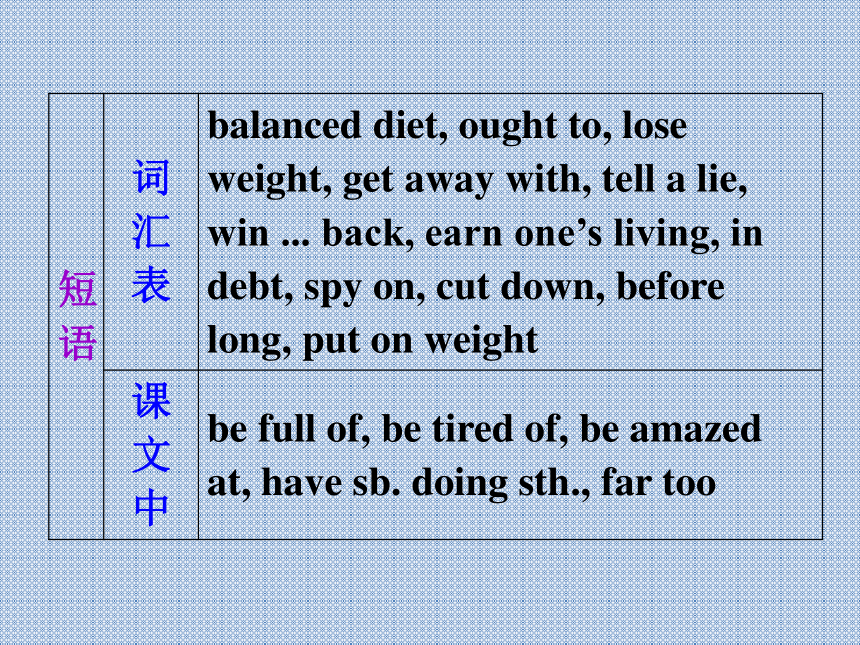
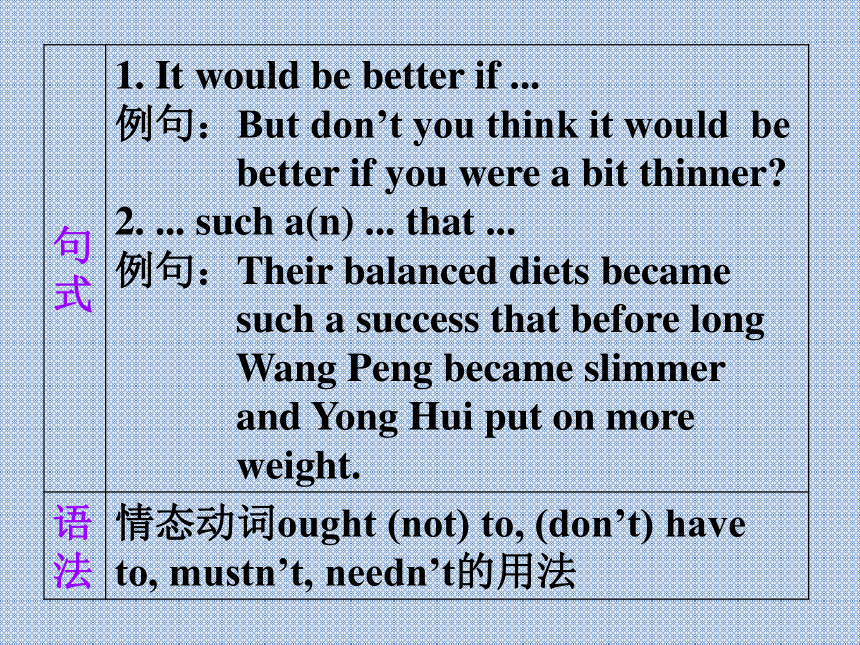
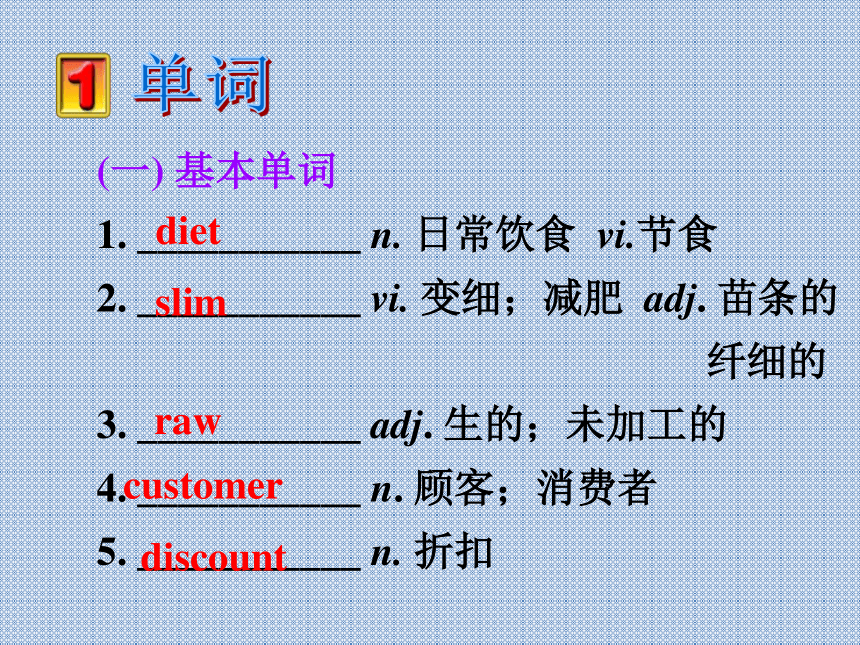
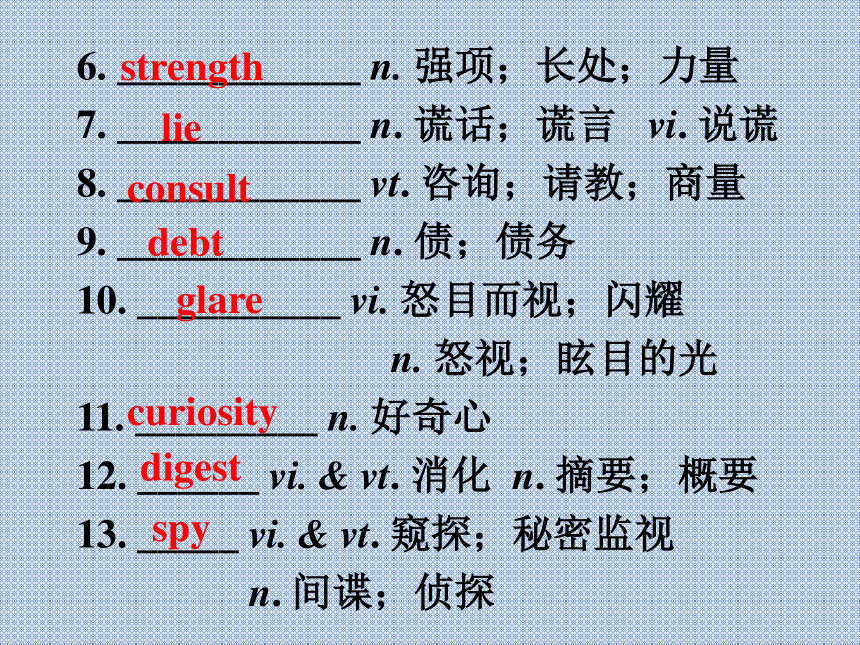
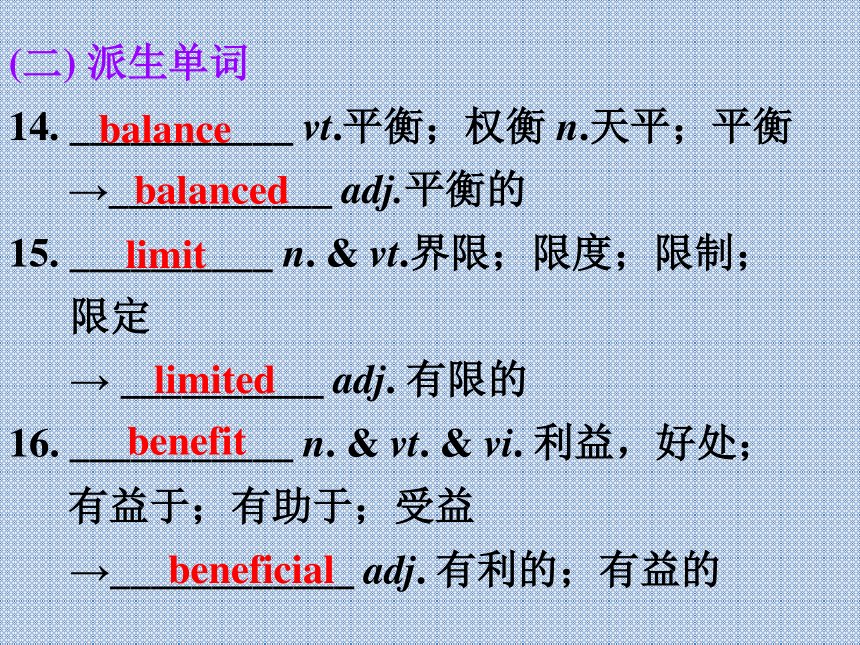
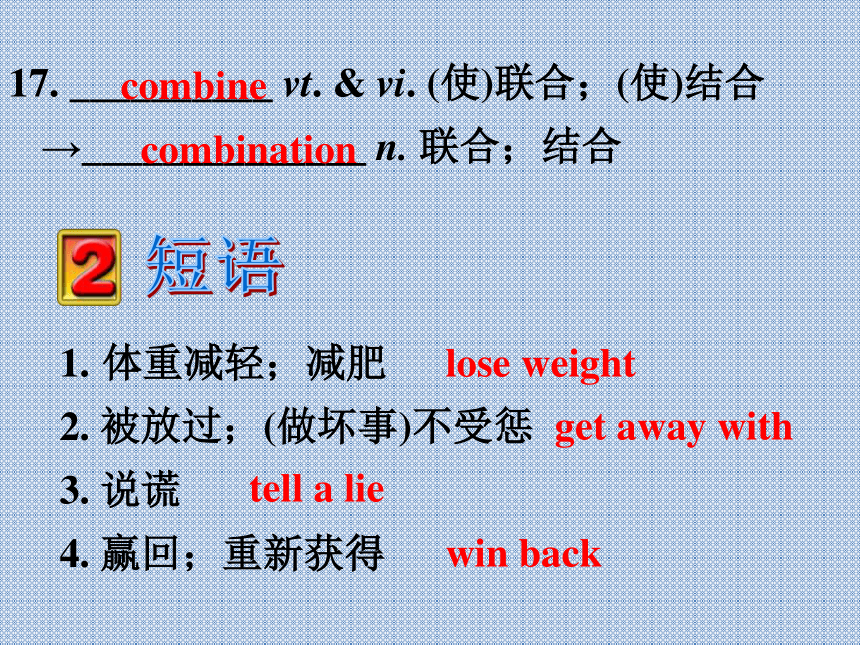
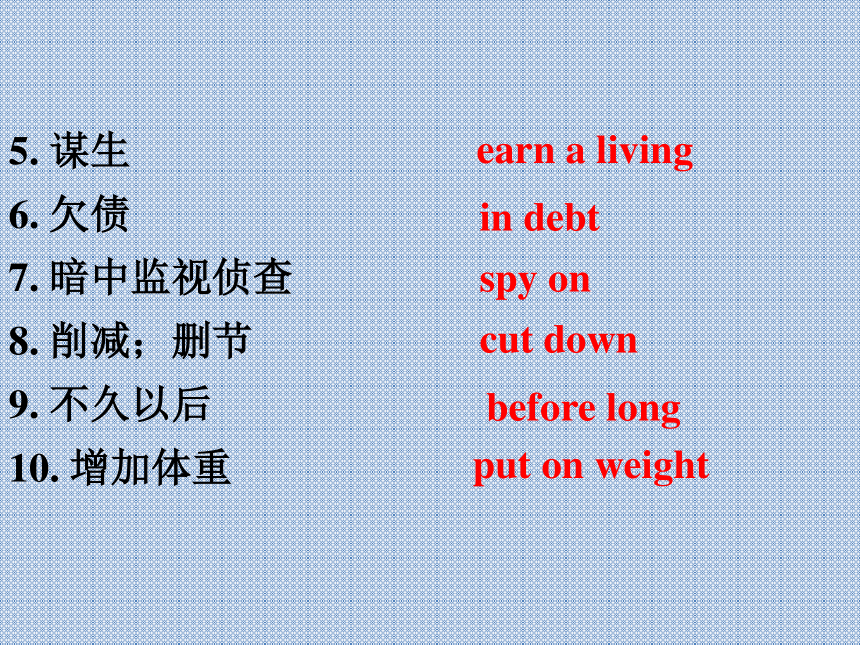
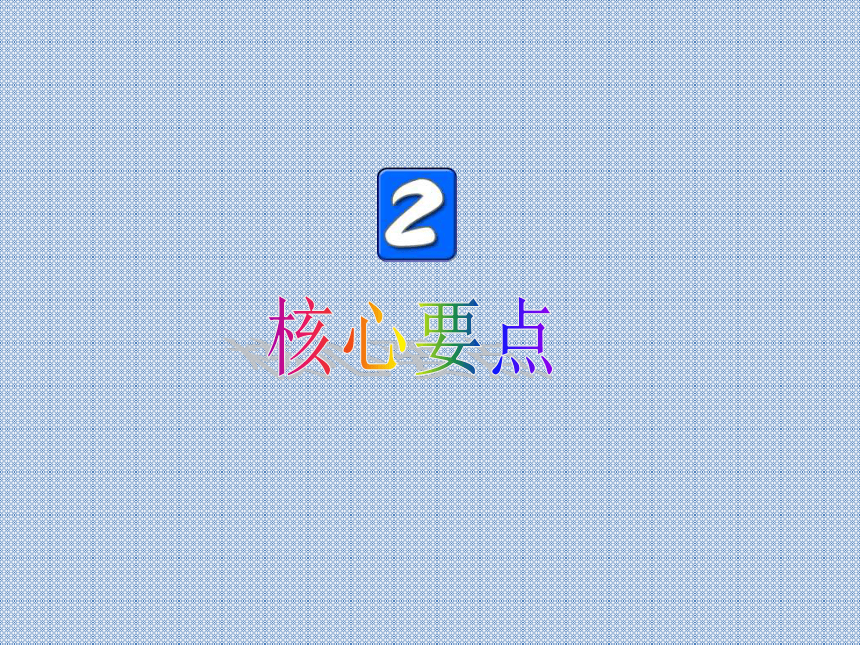
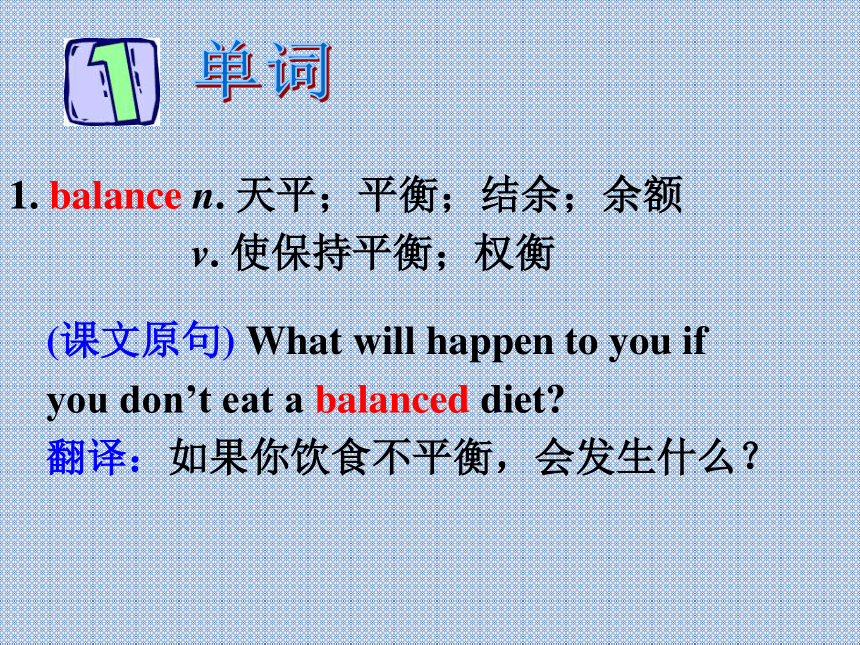
文档简介
(共56张PPT)
Unit 2 Healthy eating
知识清单
单
词 名词 指食物:nut, bean, pea, cucumber, mushroom, eggplant, pepper, peach, lemon, mutton, bacon, vinegar, carrot, garlic
其它:diet, curiosity, hostess, lie, fibre, customer, discount, weakness, strength, benefit, breast
动词 balance, barbecue, fry, ought, slim, consult, spy, digest, glare, limit, sigh, combine
形容词 roast, raw, limited
短
语 词汇表 balanced diet, ought to, lose weight, get away with, tell a lie, win ... back, earn one’s living, in debt, spy on, cut down, before long, put on weight
课文中 be full of, be tired of, be amazed at, have sb. doing sth., far too
句
式 1. It would be better if ...
例句:But don’t you think it would be
better if you were a bit thinner?
2. ... such a(n) ... that ...
例句:Their balanced diets became
such a success that before long
Wang Peng became slimmer
and Yong Hui put on more
weight.
语
法 情态动词ought (not) to, (don’t) have to, mustn’t, needn’t的用法
(一) 基本单词
1. ___________ n. 日常饮食 vi.节食
2. ___________ vi. 变细;减肥 adj. 苗条的
纤细的
3. ___________ adj. 生的;未加工的
4. ___________ n. 顾客;消费者
5. ___________ n. 折扣
diet
slim
raw
customer
discount
单词
6. ____________ n. 强项;长处;力量
7. ____________ n. 谎话;谎言 vi. 说谎
8. ____________ vt. 咨询;请教;商量
9. ____________ n. 债;债务
10. __________ vi. 怒目而视;闪耀
n. 怒视;眩目的光
11. _________ n. 好奇心
12. ______ vi. & vt. 消化 n. 摘要;概要
13. _____ vi. & vt. 窥探;秘密监视
n. 间谍;侦探
strength
lie
consult
debt
glare
curiosity
digest
spy
(二) 派生单词
14. ___________ vt.平衡;权衡 n.天平;平衡→___________ adj.平衡的
15. __________ n. & vt.界限;限度;限制;
限定
→ __________ adj. 有限的
16. ___________ n. & vt. & vi. 利益,好处;有益于;有助于;受益
→____________ adj. 有利的;有益的
balance
balanced
limit
limited
benefit
beneficial
体重减轻;减肥
2. 被放过;(做坏事)不受惩
3. 说谎
4. 赢回;重新获得
17. __________ vt. & vi. (使)联合;(使)结合→______________ n. 联合;结合
combine
combination
lose weight
get away with
tell a lie
win back
短语
5. 谋生
6. 欠债
7. 暗中监视侦查
8. 削减;删节
9. 不久以后
10. 增加体重
earn a living
in debt
spy on
cut down
before long
put on weight
核心要点
1. balance n. 天平;平衡;结余;余额
v. 使保持平衡;权衡
(课文原句) What will happen to you if you don’t eat a balanced diet?
翻译:如果你饮食不平衡,会发生什么?
单词
【归纳】
作动词时,“平衡,权衡”,常用于以下结构:
balance (sth.) on sth. 使……在……上保持平衡
balance sth. against sth. 权衡……和……的重要性
作名词时,“天平,平衡”,常用短语:
keep one’s balance 保持平衡,保持镇静;lose one’s balance身体失去平衡,心慌意乱;
keep a balance between... and...
保持……与……间的均衡;
off/ out of balance 失去平衡;
on balance 总的说来,两相比较,收支相抵;
(be / hang) in the balance
悬而未决的,结果未定的。
【拓展】 balanced? adj. 平衡的
When?he?was?running?after?his?brother,?theboy?lost?his?___?and?had?a?bad?fall.? (2015湖北卷)
A. balance???????? ?B. chance??????????
C. memory????????? D. place?
A
2. lie vi. 说谎;躺;位于
n. 谎话;谎言
(课文原句) He could not have Yong Hui getting away with telling people lies!
翻译:他可不能让雍慧哄骗人们却不受惩罚!
【归纳】
tell a lie/lies 说谎
lie to sb. 向某人说谎
lie in 在于;存在于
1) lie用作规则动词(lie,lied,lied) 时意为“说谎”。如:
She?lied?to?us?about?her?job.?
【注意】
表示这一意思时,lie可用作名词。我们一般说tell?a?lie或tell?lies,而不说say/talk/speak?a?lie(或lies)。
辨析
lie,lie,lay
2) lie用作不规则动词(lie,lay,lain)时,表示 “躺”,“(东西)平放”,“位于”等意。 e.g. He’s?still?lying?in?bed.?他还躺在床上。
3) 动词lay也是不规则动词(lay,laid,laid),是及物动词,后面必须接宾语。表示“放置” “产卵”等多种意思。如:
He?laid?his?hand?on?my?shoulder.?
他把手放在我的肩上。
The?hen?is?laying?an?egg.?母鸡在下蛋。
【注意】
lay,put,place和set都可用来表示“放置”某一物体。lay表示把某物横着或摊开着平放。put较普通,指较随意的放,不强调所放物体的姿态,可代替其它几个动词。place是比较正式的用语,指有意识地把某物放在较为确定的位置上或安排某物的顺序,有时含有较庄重的语气。set特指把某物垂直着放。
【提示】注意以下词形变化。
原形 过去式 过去分词 现在分词 词义 词性
lie lied lied lying 说谎 不及物
lie lay lain lying 躺;位于 不及物
lay laid laid laying 放置;
下蛋 及物
三者所表示的位置关系不同。试比较:
New York lies in the east of America.
纽约位于美国东部。(包含关系)
Japan lies to the east of China.
日本位于中国以东。(不包含关系)
America lies on the east of the Pacific.
美国位于太平洋东岸。(相邻关系)
lie in, lie to和lie on
3. strength n. [C]长处;强项
n. [U]力量;体力
(课文原句) The strength of the diet in
Wang Pen’s restaurant…
翻译:王鹏饭店饮食的优势在…
【归纳】
with all one’s strength
竭尽全力;全力以赴
build up one’s strength 增强体质
concentrate all strength on
把全部力量集中在……上
gather all one’s strength 使出全力
in strength 在实力上
—Why do you choose to work in an
international travel agency?
—Well, you know, English is my _____.
So it is my best choice.?
A. strength ??? ??????????????B. talent ??????
C. ability???? ?????????????????D. skill
4. consult v. 咨询;请教;商量
(课文原句) However, as she was so afraid of being laughed at by her friends, she did not consult a doctor but lived on a diet of rice, raw vegetables, bananas and lemons. 翻译:然而,因为她怕被朋友嘲笑,她没有咨询医生,只是吃一些米饭,生的蔬菜,香蕉和柠檬当作自己的饮食。
【归纳】
consult sb. 向某人请教
consult with sb. about/ on sth.
就……与某人交换意见
If?you?have?any?doubts?about?your?health,?
you’d?better ______?your?doctor?at once. ?(2015天津)
A.?convince??B.?consult??C.?avoid?D.?affect
B
5. glare n. “刺眼的强光,令人不快的光,
怒视的目光,愤怒的表情”。
v. “发耀眼的强光,怒视”。
作“怒视”讲时,常用于glare at结构。
(课文原句) She did not look happy but glared at him.
翻译:雍慧瞪着他,看上去不高兴。
【拓展】
glaring? adj. 耀眼的,显著的,怒视的
glare at “怒目而视,恶狠狠地盯着”,带有生气的感彩。glare at sb. 意思相当于stare at sb. angrily。如:
Don’t glare at your father like that!?
stare at“凝视,盯着看”,仅仅表示动作,不带有感彩。如:
Rose’s father?lifted?his?head?and?stared?at?
her.
辨析 glare at, stare at, glance at
glance at “匆匆一瞥,迅速地看一眼”,强调这个动作速度很快。如:
Glancing at her watch, Jane saw that she was late.
6. limit vt. 限制;限定 n. 界限;限度
(课文原句) I don’t want to upset you, but I found your menu so limited that I stopped worrying and started advertising the benefits of my food.
翻译:我并不想让你心烦,不过我发现你菜谱上的菜太少了,所以我也就不着急了,我也开始宣传我餐饮的食物的好处。
【归纳】
limit...to... 把……限制在……内
beyond the limit 超过限度
within the limits of 在……范围内
set a limit to sth. 对……规定限度
【拓展】
limited adj. 有限的
be limited to sth. 限制于……内
limitation n. 限制;局限
benefit vt. & vi. 有益于;有助于;受益
n. 好处;利益;优势
【归纳】
benefit from/ by... 从……受益;得益于
benefit sb. 对某人有益
be of (much, great) benefit to sb.
=be beneficial to sb. 对某人有益处
for the benefit of... 为了……的利益
China has been pushing the reform of
public hospitals _____ all its citizens.
A. in charge of???? ??????
B. for the purpose of
C. in honor of???? ???????
D. for the benefit of
1. lose weight 减肥;体重减轻
(课文原句) Want to lose weight?
翻译:想变瘦吗?
短语
【拓展】
put on weight 增加体重
by weight 按重量
carry/ have weight 重要;有影响
add weight to 增加对……的重要性
gain weight 增加体重
get weight 发胖
2. get away with 被放过;(做坏事)不受惩罚
(课文原句) He could not have Yong Hui getting away with telling people lies!
翻译:他可不能让雍慧哄骗人们却不受惩罚!
【拓展】
get away from... 摆脱/逃离/(得以)脱身
get away with sth. 携带某物逃跑
take away from 夺走;强行带走
keep (sb.) away from (使某人)远离……
break away from 脱离;挣脱
run away from 从……跑开/逃跑
3. in debt 负债
(课文原句) He did not look forward to being in debt because his restaurant was no longer popular.
翻译:他不希望由于餐饮不受欢迎而
负债。
【拓展】
be in heavy debt 负债累累
be in debt to sb. 欠某人债
be in one’s debt 感激某人;欠某人的情
pay off all the debts 还清债务(动作)
be out of debt 不欠债(状态)
get/ run into debt 陷入债务
4. cut down 削减;删节;砍
(课文原句) In this way they cut down the fat and increased the fiber in the meal.
翻译:这样,他们减少了饭菜中的脂肪含量,增加了纤维素。
【拓展】
cut up 切碎;使伤心/难受
cut away 切除;除掉
cut back 削减;缩减
cut in 插嘴;超车抢道
cut off 切断;使分离;使隔绝
cut out 切去;删去
1. “Nothing could be better,” he thought.
比较级与否定词连用,表达最高级含义。常用的否定词有:no, not, never, hardly, nothing, nobody等。
表示最高级意义的几种特殊句式:
never+比较级
nothing/no+so+原级+as...
nothing/no+比较级+than...
can/could+never/not+enough/ too
句式
2. He could not have Yong Hui getting away
with telling people lies!
have sb. doing sth. 意为“允许某人做某事”时,常用于否定句;意为“使某人做某事”
时,多用于肯定句。
have后接三种形式的宾语补足语:
have sb./sth. doing sth.让某人做某事/让某事发生(动作持续)
have sb. do sth.使某人做某事(相当于make sb. do sth.或get sb. to do sth.)
have sth. done让(别人)做某事
语法
一、ought to和ought not to
ought to表示义务、要求或劝告。如:
You were out enjoying yourself when you ought to have been studying.
We ought to give her a present for her birthday.
You ought to go to class right away.
情态动词(二)
ought to可表示推测,暗含很大可能性。如:
The boy left two hours ago, so he ought to be there by now.
ought to的否定结构是oughtn’t to或ought not to。如:
You oughtn’t/ ought not to leave in such a hurry.
二、have to
have to客观义务/需要,“必须,不得不”。如:
If you earn more than 3,500 yuan each month in China, you will have to pay tax.
第三人称单数形式是has to,一般过去式是had to,一般将来式是will have to。如:
Li Hua has to pass an examination before he can start work.
My car was broken, so I had to walk home.
It’ll have to be on a Sunday. I’ll be working every other day.
三、mustn’t和needn’t
mustn’t 表示“禁止,不可以”。如:
You mustn’t tell Jerry what I’ve told you.
needn’t表示“不必,不需要”。如:
It’s warm today. You needn’t put on a thick coat.
选用方框内合适的内容完成下面的对话(可
重复选用)。
Alice: What do you usually do after school?
Tom: I usually go to the playground to play basketball. But I know that I _______ go home first.
Alice: Why don’t you go home directly?
ought to, oughtn’t to, have to, needn’t, mustn’t
ought to
Tom: Because my mother usually makes me do my homework first and I _______?listen to her. So if I go home first, I can’t have a rest and relax myself. You know, I am very tired.
Alice: Does your mother know that?
Tom: No. I think she _______ know that because she never listens to me.
ought to, oughtn’t to, have to, needn’t, mustn’t
have to ?
needn’t
Alice: I don’t think you are right. You ___________________ treat your mother like that. I think that you should tell your mother what you think. She will understand you. Besides, you __________________ hide your feelings from your mother; you should learn to communicate with her.
oughtn’t to/ mustn’t
oughtn’t to/ mustn’t?
ought to, oughtn’t to, have to, needn’t, mustn’t
Tom: Thank you for your advice. I will try my best.
Alice: OK. I hope you can have a good talk
with your mother.
1. I ___ have worried before I came to the new school, for my classmates here are very friendly to me. (2015天津)
A. mightn’t B. mustn’t
C. needn’t D. couldn’t
C ?
高考链接
2. —I’ve?prepared?all?kinds?of?food?for?the?
picnic.?
—Do?you?mean?we?_____?bring?anything?
with?us?? (2014·湖南卷)
A.?can’t???B.?mustn’t?C.?shan’t??D.?needn’t?
句意:“我已经为这次野炊准备了各种各样的食物。”“你的意思是说我们不需要携带任何东西了?”此处needn’t表示“没有必要”。
D?
3.【2016·北京】You ________ play now! You shall finish your homework first!
A. needn’t
B. mustn’t
C. wouldn’t
D. shouldn’t
B ?
再见
Unit 2 Healthy eating
知识清单
单
词 名词 指食物:nut, bean, pea, cucumber, mushroom, eggplant, pepper, peach, lemon, mutton, bacon, vinegar, carrot, garlic
其它:diet, curiosity, hostess, lie, fibre, customer, discount, weakness, strength, benefit, breast
动词 balance, barbecue, fry, ought, slim, consult, spy, digest, glare, limit, sigh, combine
形容词 roast, raw, limited
短
语 词汇表 balanced diet, ought to, lose weight, get away with, tell a lie, win ... back, earn one’s living, in debt, spy on, cut down, before long, put on weight
课文中 be full of, be tired of, be amazed at, have sb. doing sth., far too
句
式 1. It would be better if ...
例句:But don’t you think it would be
better if you were a bit thinner?
2. ... such a(n) ... that ...
例句:Their balanced diets became
such a success that before long
Wang Peng became slimmer
and Yong Hui put on more
weight.
语
法 情态动词ought (not) to, (don’t) have to, mustn’t, needn’t的用法
(一) 基本单词
1. ___________ n. 日常饮食 vi.节食
2. ___________ vi. 变细;减肥 adj. 苗条的
纤细的
3. ___________ adj. 生的;未加工的
4. ___________ n. 顾客;消费者
5. ___________ n. 折扣
diet
slim
raw
customer
discount
单词
6. ____________ n. 强项;长处;力量
7. ____________ n. 谎话;谎言 vi. 说谎
8. ____________ vt. 咨询;请教;商量
9. ____________ n. 债;债务
10. __________ vi. 怒目而视;闪耀
n. 怒视;眩目的光
11. _________ n. 好奇心
12. ______ vi. & vt. 消化 n. 摘要;概要
13. _____ vi. & vt. 窥探;秘密监视
n. 间谍;侦探
strength
lie
consult
debt
glare
curiosity
digest
spy
(二) 派生单词
14. ___________ vt.平衡;权衡 n.天平;平衡→___________ adj.平衡的
15. __________ n. & vt.界限;限度;限制;
限定
→ __________ adj. 有限的
16. ___________ n. & vt. & vi. 利益,好处;有益于;有助于;受益
→____________ adj. 有利的;有益的
balance
balanced
limit
limited
benefit
beneficial
体重减轻;减肥
2. 被放过;(做坏事)不受惩
3. 说谎
4. 赢回;重新获得
17. __________ vt. & vi. (使)联合;(使)结合→______________ n. 联合;结合
combine
combination
lose weight
get away with
tell a lie
win back
短语
5. 谋生
6. 欠债
7. 暗中监视侦查
8. 削减;删节
9. 不久以后
10. 增加体重
earn a living
in debt
spy on
cut down
before long
put on weight
核心要点
1. balance n. 天平;平衡;结余;余额
v. 使保持平衡;权衡
(课文原句) What will happen to you if you don’t eat a balanced diet?
翻译:如果你饮食不平衡,会发生什么?
单词
【归纳】
作动词时,“平衡,权衡”,常用于以下结构:
balance (sth.) on sth. 使……在……上保持平衡
balance sth. against sth. 权衡……和……的重要性
作名词时,“天平,平衡”,常用短语:
keep one’s balance 保持平衡,保持镇静;lose one’s balance身体失去平衡,心慌意乱;
keep a balance between... and...
保持……与……间的均衡;
off/ out of balance 失去平衡;
on balance 总的说来,两相比较,收支相抵;
(be / hang) in the balance
悬而未决的,结果未定的。
【拓展】 balanced? adj. 平衡的
When?he?was?running?after?his?brother,?theboy?lost?his?___?and?had?a?bad?fall.? (2015湖北卷)
A. balance???????? ?B. chance??????????
C. memory????????? D. place?
A
2. lie vi. 说谎;躺;位于
n. 谎话;谎言
(课文原句) He could not have Yong Hui getting away with telling people lies!
翻译:他可不能让雍慧哄骗人们却不受惩罚!
【归纳】
tell a lie/lies 说谎
lie to sb. 向某人说谎
lie in 在于;存在于
1) lie用作规则动词(lie,lied,lied) 时意为“说谎”。如:
She?lied?to?us?about?her?job.?
【注意】
表示这一意思时,lie可用作名词。我们一般说tell?a?lie或tell?lies,而不说say/talk/speak?a?lie(或lies)。
辨析
lie,lie,lay
2) lie用作不规则动词(lie,lay,lain)时,表示 “躺”,“(东西)平放”,“位于”等意。 e.g. He’s?still?lying?in?bed.?他还躺在床上。
3) 动词lay也是不规则动词(lay,laid,laid),是及物动词,后面必须接宾语。表示“放置” “产卵”等多种意思。如:
He?laid?his?hand?on?my?shoulder.?
他把手放在我的肩上。
The?hen?is?laying?an?egg.?母鸡在下蛋。
【注意】
lay,put,place和set都可用来表示“放置”某一物体。lay表示把某物横着或摊开着平放。put较普通,指较随意的放,不强调所放物体的姿态,可代替其它几个动词。place是比较正式的用语,指有意识地把某物放在较为确定的位置上或安排某物的顺序,有时含有较庄重的语气。set特指把某物垂直着放。
【提示】注意以下词形变化。
原形 过去式 过去分词 现在分词 词义 词性
lie lied lied lying 说谎 不及物
lie lay lain lying 躺;位于 不及物
lay laid laid laying 放置;
下蛋 及物
三者所表示的位置关系不同。试比较:
New York lies in the east of America.
纽约位于美国东部。(包含关系)
Japan lies to the east of China.
日本位于中国以东。(不包含关系)
America lies on the east of the Pacific.
美国位于太平洋东岸。(相邻关系)
lie in, lie to和lie on
3. strength n. [C]长处;强项
n. [U]力量;体力
(课文原句) The strength of the diet in
Wang Pen’s restaurant…
翻译:王鹏饭店饮食的优势在…
【归纳】
with all one’s strength
竭尽全力;全力以赴
build up one’s strength 增强体质
concentrate all strength on
把全部力量集中在……上
gather all one’s strength 使出全力
in strength 在实力上
—Why do you choose to work in an
international travel agency?
—Well, you know, English is my _____.
So it is my best choice.?
A. strength ??? ??????????????B. talent ??????
C. ability???? ?????????????????D. skill
4. consult v. 咨询;请教;商量
(课文原句) However, as she was so afraid of being laughed at by her friends, she did not consult a doctor but lived on a diet of rice, raw vegetables, bananas and lemons. 翻译:然而,因为她怕被朋友嘲笑,她没有咨询医生,只是吃一些米饭,生的蔬菜,香蕉和柠檬当作自己的饮食。
【归纳】
consult sb. 向某人请教
consult with sb. about/ on sth.
就……与某人交换意见
If?you?have?any?doubts?about?your?health,?
you’d?better ______?your?doctor?at once. ?(2015天津)
A.?convince??B.?consult??C.?avoid?D.?affect
B
5. glare n. “刺眼的强光,令人不快的光,
怒视的目光,愤怒的表情”。
v. “发耀眼的强光,怒视”。
作“怒视”讲时,常用于glare at结构。
(课文原句) She did not look happy but glared at him.
翻译:雍慧瞪着他,看上去不高兴。
【拓展】
glaring? adj. 耀眼的,显著的,怒视的
glare at “怒目而视,恶狠狠地盯着”,带有生气的感彩。glare at sb. 意思相当于stare at sb. angrily。如:
Don’t glare at your father like that!?
stare at“凝视,盯着看”,仅仅表示动作,不带有感彩。如:
Rose’s father?lifted?his?head?and?stared?at?
her.
辨析 glare at, stare at, glance at
glance at “匆匆一瞥,迅速地看一眼”,强调这个动作速度很快。如:
Glancing at her watch, Jane saw that she was late.
6. limit vt. 限制;限定 n. 界限;限度
(课文原句) I don’t want to upset you, but I found your menu so limited that I stopped worrying and started advertising the benefits of my food.
翻译:我并不想让你心烦,不过我发现你菜谱上的菜太少了,所以我也就不着急了,我也开始宣传我餐饮的食物的好处。
【归纳】
limit...to... 把……限制在……内
beyond the limit 超过限度
within the limits of 在……范围内
set a limit to sth. 对……规定限度
【拓展】
limited adj. 有限的
be limited to sth. 限制于……内
limitation n. 限制;局限
benefit vt. & vi. 有益于;有助于;受益
n. 好处;利益;优势
【归纳】
benefit from/ by... 从……受益;得益于
benefit sb. 对某人有益
be of (much, great) benefit to sb.
=be beneficial to sb. 对某人有益处
for the benefit of... 为了……的利益
China has been pushing the reform of
public hospitals _____ all its citizens.
A. in charge of???? ??????
B. for the purpose of
C. in honor of???? ???????
D. for the benefit of
1. lose weight 减肥;体重减轻
(课文原句) Want to lose weight?
翻译:想变瘦吗?
短语
【拓展】
put on weight 增加体重
by weight 按重量
carry/ have weight 重要;有影响
add weight to 增加对……的重要性
gain weight 增加体重
get weight 发胖
2. get away with 被放过;(做坏事)不受惩罚
(课文原句) He could not have Yong Hui getting away with telling people lies!
翻译:他可不能让雍慧哄骗人们却不受惩罚!
【拓展】
get away from... 摆脱/逃离/(得以)脱身
get away with sth. 携带某物逃跑
take away from 夺走;强行带走
keep (sb.) away from (使某人)远离……
break away from 脱离;挣脱
run away from 从……跑开/逃跑
3. in debt 负债
(课文原句) He did not look forward to being in debt because his restaurant was no longer popular.
翻译:他不希望由于餐饮不受欢迎而
负债。
【拓展】
be in heavy debt 负债累累
be in debt to sb. 欠某人债
be in one’s debt 感激某人;欠某人的情
pay off all the debts 还清债务(动作)
be out of debt 不欠债(状态)
get/ run into debt 陷入债务
4. cut down 削减;删节;砍
(课文原句) In this way they cut down the fat and increased the fiber in the meal.
翻译:这样,他们减少了饭菜中的脂肪含量,增加了纤维素。
【拓展】
cut up 切碎;使伤心/难受
cut away 切除;除掉
cut back 削减;缩减
cut in 插嘴;超车抢道
cut off 切断;使分离;使隔绝
cut out 切去;删去
1. “Nothing could be better,” he thought.
比较级与否定词连用,表达最高级含义。常用的否定词有:no, not, never, hardly, nothing, nobody等。
表示最高级意义的几种特殊句式:
never+比较级
nothing/no+so+原级+as...
nothing/no+比较级+than...
can/could+never/not+enough/ too
句式
2. He could not have Yong Hui getting away
with telling people lies!
have sb. doing sth. 意为“允许某人做某事”时,常用于否定句;意为“使某人做某事”
时,多用于肯定句。
have后接三种形式的宾语补足语:
have sb./sth. doing sth.让某人做某事/让某事发生(动作持续)
have sb. do sth.使某人做某事(相当于make sb. do sth.或get sb. to do sth.)
have sth. done让(别人)做某事
语法
一、ought to和ought not to
ought to表示义务、要求或劝告。如:
You were out enjoying yourself when you ought to have been studying.
We ought to give her a present for her birthday.
You ought to go to class right away.
情态动词(二)
ought to可表示推测,暗含很大可能性。如:
The boy left two hours ago, so he ought to be there by now.
ought to的否定结构是oughtn’t to或ought not to。如:
You oughtn’t/ ought not to leave in such a hurry.
二、have to
have to客观义务/需要,“必须,不得不”。如:
If you earn more than 3,500 yuan each month in China, you will have to pay tax.
第三人称单数形式是has to,一般过去式是had to,一般将来式是will have to。如:
Li Hua has to pass an examination before he can start work.
My car was broken, so I had to walk home.
It’ll have to be on a Sunday. I’ll be working every other day.
三、mustn’t和needn’t
mustn’t 表示“禁止,不可以”。如:
You mustn’t tell Jerry what I’ve told you.
needn’t表示“不必,不需要”。如:
It’s warm today. You needn’t put on a thick coat.
选用方框内合适的内容完成下面的对话(可
重复选用)。
Alice: What do you usually do after school?
Tom: I usually go to the playground to play basketball. But I know that I _______ go home first.
Alice: Why don’t you go home directly?
ought to, oughtn’t to, have to, needn’t, mustn’t
ought to
Tom: Because my mother usually makes me do my homework first and I _______?listen to her. So if I go home first, I can’t have a rest and relax myself. You know, I am very tired.
Alice: Does your mother know that?
Tom: No. I think she _______ know that because she never listens to me.
ought to, oughtn’t to, have to, needn’t, mustn’t
have to ?
needn’t
Alice: I don’t think you are right. You ___________________ treat your mother like that. I think that you should tell your mother what you think. She will understand you. Besides, you __________________ hide your feelings from your mother; you should learn to communicate with her.
oughtn’t to/ mustn’t
oughtn’t to/ mustn’t?
ought to, oughtn’t to, have to, needn’t, mustn’t
Tom: Thank you for your advice. I will try my best.
Alice: OK. I hope you can have a good talk
with your mother.
1. I ___ have worried before I came to the new school, for my classmates here are very friendly to me. (2015天津)
A. mightn’t B. mustn’t
C. needn’t D. couldn’t
C ?
高考链接
2. —I’ve?prepared?all?kinds?of?food?for?the?
picnic.?
—Do?you?mean?we?_____?bring?anything?
with?us?? (2014·湖南卷)
A.?can’t???B.?mustn’t?C.?shan’t??D.?needn’t?
句意:“我已经为这次野炊准备了各种各样的食物。”“你的意思是说我们不需要携带任何东西了?”此处needn’t表示“没有必要”。
D?
3.【2016·北京】You ________ play now! You shall finish your homework first!
A. needn’t
B. mustn’t
C. wouldn’t
D. shouldn’t
B ?
再见
同课章节目录
